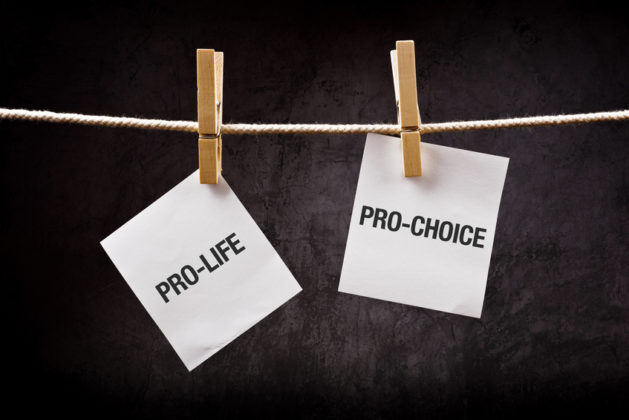It’s simple: I must not impose my beliefs, my choices, on others.
As the presidential campaign has ground on, I’ve wrestled with a fundamental question: As a Christian who believes that life begins at conception and thanks God his son’s birth mother chose adoption, how can I not vote based solely on the issue of abortion?
At the second debate, Donald Trump described his obscene bragging about sexual assault as “locker room talk” and quickly pivoted to ISIS killing people. There are more important issues than my words, he implied. In an interview on Out Front with Erin Burnett, Rep. Trent Franks made the same argument but substituted abortion. “It’s the difference between degrading and insulting and the difference between life and death,” Franks said.
This argument is very personally challenging. If I believe life begins at conception, then how can I not weight abortion more than anything else as I determine my vote? How can I essentially be pro-choice by ascribing significance to any other issue or consideration? Many other Christians must feel the same way, as shown by evangelical’s continued support for Trump despite multiple allegations of sexual assaults.
Here’s the short answer: I cannot in good conscience refuse the option of abortion when women were raped or experience life-threatening complications from their pregnancies.
Now, here’s the long answer.
God bless rape victims who carry their babies to full-term, endure labor, and then put their children up for adoption or raise them themselves, but who am I to tell them that they must? Who am I to tell a woman whose pregnancy is killing her that she has no medical recourse if she wants it? What can I possibly say to her spouse, or to any older children she might have, to justify taking away the option of saving her life?
It’s easy to say you’d carry or keep the baby if you’ve never been impregnated by a rapist, possibly at a time in your life when pregnancy could be incredibly difficult. It’s easy to say the mother’s life doesn’t outweigh the baby’s life when you, or your wife or your mother, are not the one dying. Of course the mother’s life doesn’t matter more, but it also doesn’t matter less. Which choice is the right one?
It strikes me as the height of “unloving” to impose what I think people in these situations ought to do onto people who are actually in these situations and must live—or die—with the consequences of any decision they make. Yet that is exactly what overturning Roe v. Wade would do.
One might counter that we can regulate abortion to allow for exceptions. As much faith as I put in the government, I don’t trust it to effectively determine who was and wasn’t raped, whose pregnancy is killing her and whose isn’t.
The criminal justice system has great difficulty investigating rape. If evidence is corrupted or lacking, the case may become a “he said, she said.” Many women don’t even come forward because of their shock, their humiliation, the further violation of the rape kit, the victim-shaming, and many other reasons.
I don’t know many people who want bureaucrats making healthcare decisions for them, especially when one’s life or long-term health might be endangered. I doubt our government can evaluate a pregnant woman’s health quickly enough to save her life or avoid long-term health problems (including not being able to have future children).
So if I want exceptions for rape victims and women with life-threatening complications, then I must accept a woman’s right to choose. I must not impose my beliefs, my choices, on others.
In a sense, this position is also “pro-life.” It values the lives of mothers who might otherwise die, who may have partners, who may already have children. It values the lives of victims who, through no fault of their own, find themselves pregnant when they did not plan to be. It recognizes that women are not just baby-making machines.
One could argue I have succumbed to moral relativism, that we simply cannot allow exceptions for certain circumstances, that we must be absolutist on this issue. If every woman had the support necessary during pregnancy and child-rearing, if men stopped raping women, if medical alternatives could always save women’s lives, then I might agree.
Instead, I argue that we must be absolutist in loving others. Partially, this means empathizing with people facing agonizing decisions, often without a clear right or wrong answer, and not judging from afar what they should or should not do. It also means extending support that might lead them to an answer.
Organizations like BirthRight.org, for example, offer support to women who don’t have the financial means for either pregnancy or raising a child, who may lack support from their partners or families, who may already be struggling to raise the children they have. Fewer women choose abortion than in the past, in part because of the support of loving, non-judgmental people and groups like Birth Right and other crisis pregnancy centers.
Imagine what Christians and other pro-lifers could do about abortion if they stopped obsessing about presidents, Supreme Court justices, and legal cases and began obsessing about loving, serving, and supporting women in need.
Eric Sentell teaches composition at Southeast Missouri State University. He has written many essays for Role Reboot and The Good Men Project. He has also published short fiction in various online journals, and his scholarly publications include Relevant Rhetoric, Technical Communication, and the Writing Lab Newsletter. Follow him @ericsentell and find more of his work at ericsentell.wordpress.com.
Other Links:

